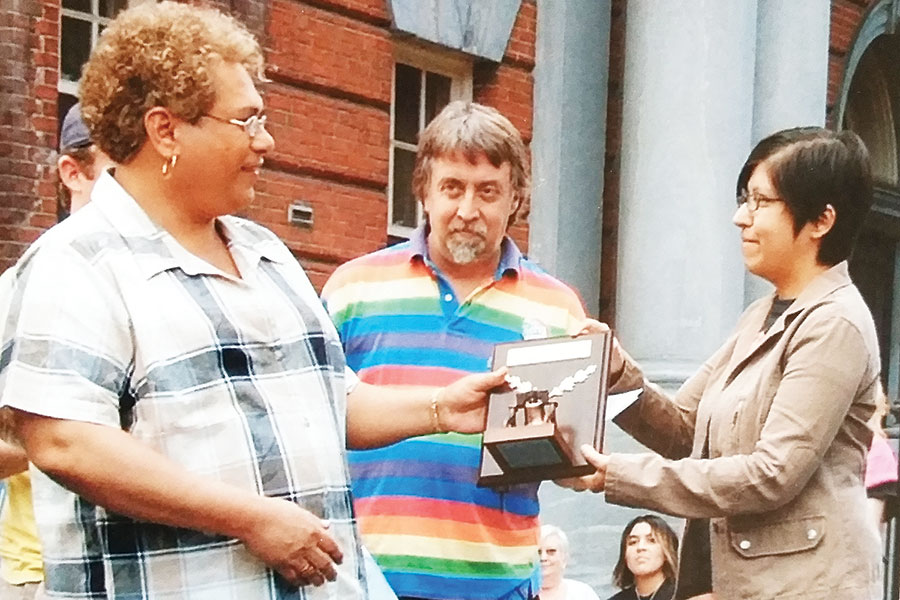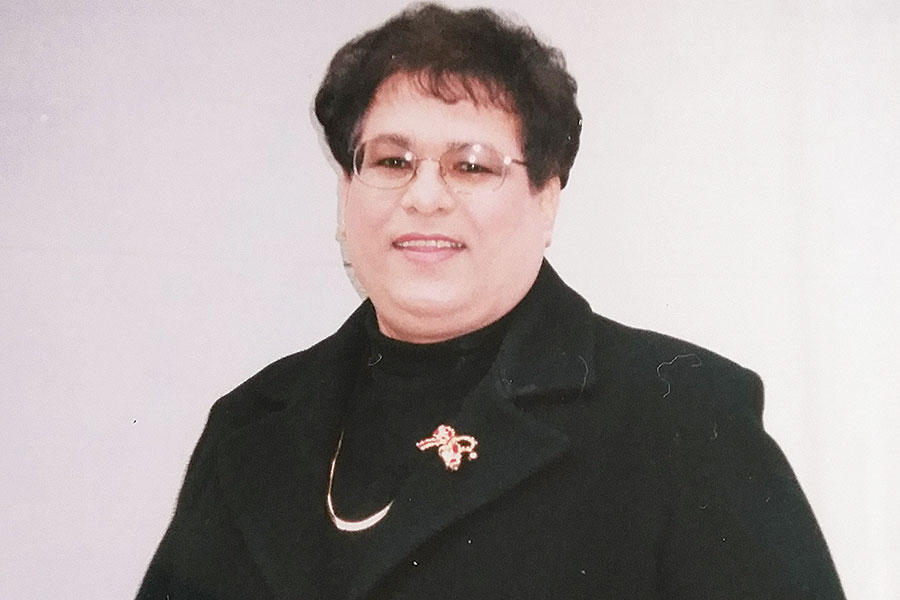
Maria Gonzalez spent the last 15 years of her life as a woman. Her dying wish was to be buried in a pretty dress while wearing red lipstick and matching nail polish, according to a relative who was her primary caregiver.
But on the day of her funeral, family and friends said goodbye to her ashes, which were placed in a wooden box adorned with white and blue flowers. A blue ribbon wrapped around the flowers next to a metal pendant that read: “Dad.”
Gonzalez did not include her funeral wishes in her will and didn’t put her request in writing. Gonzalez’s ex-wife, Chrissy Hernandez Gonzalez, and daughter, Celina Huber, organized the service, even though they were not supportive of her living as a woman, said family members who were close to them.
“Family life was difficult for Maria,” said Linda Greiser, Gonzalez’s sister. “When she came out, [Hernandez Gonzalez] kicked her out of the house and wanted nothing to do with her. There wasn’t much of a relationship between my sister and [Huber] for 15 years. She made attempts, but nothing worked.”
“Maria expressed to me numerous times that if her ex-wife or daughter were in charge of her funeral, she would have the worst funeral ever. Unfortunately, she never put anything into writing,” Greiser said.
Gonzalez was the first openly transgender officer in the Philadelphia Police Department. She died Oct. 12 from lung disease at age 71.
Gonzalez joined the PPD in 1967. She spent 21 years on the force in North Philadelphia’s 23rd District, which included a stint on horseback as a mounted officer. For 15 years, Gonzalez served as a firearms instructor at the Police Academy. In 2004, she publicly announced her transition after delivering a letter to a supervisor announcing her decision to live and work as a woman.
Gonzalez was transferred to the Differential Police Response Unit — which handles minor incidents that wouldn’t normally merit 911 attention — in 2004 before retiring in 2007.
Her funeral service was held Oct. 18 at the Reilly-Rakowski Funeral Home in Port Richmond. Delilah Elsetinow, Gonzalez’s second cousin whom she referred to as her niece, said she was overcome with sadness upon seeing her aunt being remembered as a man during her funeral.
“She was not a man, but that’s how she was laid to rest,” said Elsetinow. “Her daughter and ex-wife continuously referred to my aunt as a ‘he’ or a ‘him’ during the service. There were two big billboards filled with pictures of [Gonzalez] as a man and a slideshow of pictures before she transitioned” at the funeral.
In protest, Elsetinow brought her own poster board filled with pictures of Gonzalez as a woman and wore a T-shirt bearing an image of her aunt wearing red lipstick and matching nail polish.
Before Gonzalez’s death, Elsetinow said, she tried to help mend the broken relationship between Huber and Gonzalez, but her attempts were unsuccessful. When Gonzalez was diagnosed with small-cell lung cancer in May, Elsetinow reached out to Huber to inform her.
“I wanted to tell her daughter that she was in the hospital. I figured that after 15 years of not being around, she would be open to talking” to Gonzalez, Elsetinow said. “I felt as though her mind would change about Maria if she knew that she was sick, but it didn’t. She refused to call her ‘Mom.’ She continued to call her ‘Dad.’”
In response to PGN’s request for comment, Huber said in a Facebook message, “This has been a difficult time for my family. Thank you for respecting our privacy.” Hernandez Gonzalez didn’t respond to a request for comment.
Gonzalez’s aunt, Roccina Rosas, chose not to attend the service because of her niece’s disregarded wishes, Elsetinow said.
After a priest delivered Gonzalez’s eulogy, Elsetinow read a message written by Rosas: “I would regret so much not speaking up. I didn’t come to [the service] because of all of the controversy over what Maria’s wishes were. Put yourself in Maria’s shoes and think how horrible it must have felt that her body and soul weren’t the same. She was in the wrong body growing up and I can’t imagine how she felt. I love her and will always remember her as the beautiful woman she was.”
Rue Landau, executive director of the Philadelphia Commission on Human Relations, knew Gonzalez and attended her funeral service. She said Hernandez Gonzalez, Huber and others “wanted to erase her female identity” after seeing a display of awards from the PPD with Gonzalez’s male name at the funeral service.
“The tension was palpable in the room. There were family members there who were very clear about depicting [Gonzalez] as her true self and wanted to honor her as a woman. They were disgusted that she would be referred to in any other way. That was putting a negative mark on her memory,” Landau said. “She was struggling in her life with her identity and this was a time when she should have been honored and remembered for her strength and determination to be the first transgender police officer to transition while being on the force.”
Gonzalez was also the aunt of Gloria Casarez, the late LGBTQ activist who served as the first director of the Mayor’s Office of LGBT Affairs and the executive director of GALAEI. Casarez died in 2014 after a battle with cancer.
“Gloria was always very proud of [Gonzalez],” said Landau, who worked closely with Casarez. “Gloria said she moved mountains and paved an easier path for so many other people in the LGBTQ community.”
When Gonzalez underwent her transition process, Casarez advocated on her behalf to change bathroom policies for trans people in the PPD, years before so-called bathroom bills became a political issue.
“The police department was giving [Gonzalez] a lot of issues when it came to which bathroom she would use,” said Greiser. “She would say she wasn’t going into the men’s room because she wasn’t a man. The women didn’t want her in the women’s bathroom, so they had to make some changes. [Casarez] helped those changes come about.”
Before joining the PPD, Gonzalez worked at Whitman’s Chocolate factory. She had no plans of being a police officer but promised her mother she would apply to the academy after a minor run-in with the law. Greiser remembered the day her sister decided to join the force.
“Maria was arrested for shooting a gun into the Schuylkill River when she was 20. Her best friend at the time was getting drafted into the war and on his last night before that, they shot guns at the river — which happened to be right across from the Police Academy,” Greiser said. “Unfortunately for Maria, my mother was notified. She went to the police station with her City Hall friends to get Maria out. When they got her out, it was contingent on her becoming a police officer.”
Gonzalez was a 50-year member of the Philadelphia Fraternal Order of Police Lodge #5, a labor union for police officers and sheriffs. She lived with her two cats, Delilah and Jesse, and had a love for reading news publications from New York City, including The New York Post and the New York Daily News.
She also is survived by her daughter; two grandchildren; her sisters Elisa Gonzalez and Linda Greiser and nieces and nephews.

